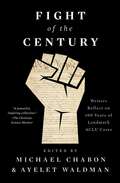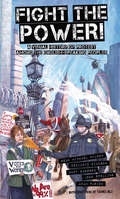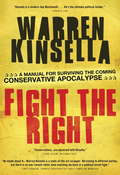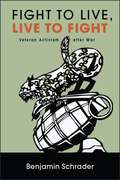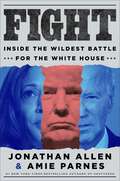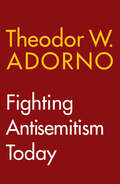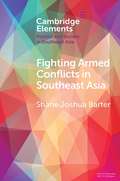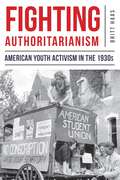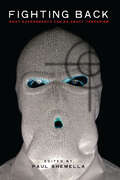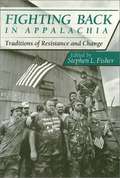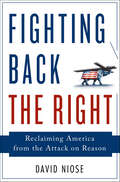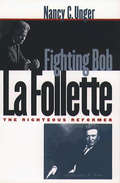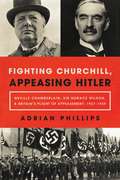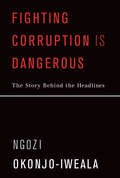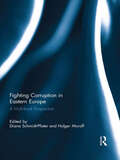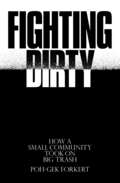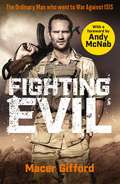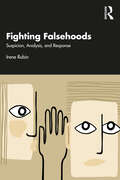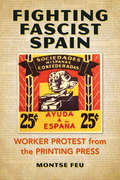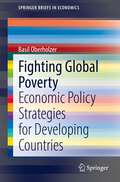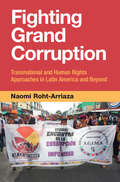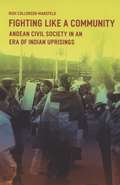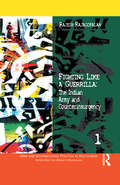- Table View
- List View
Fight of the Century: Writers Reflect on 100 Years of Landmark ACLU Cases
by Neil Gaiman Dave Eggers Scott Turow Salman Rushdie Michael Cunningham Louise Erdrich Geraldine Brooks David Handler Andrew Sean Greer Ann Patchett Meg Wolitzer Elizabeth Strout Timothy Egan Jonathan Lethem Rabih Alameddine Lauren Groff Victor Lavalle Jennifer Egan Aleksandar Hemon Anthony Doerr William Finnegan Jesmyn Ward George Saunders Marlon James Viet Thanh Nguyen Yaa Gyasi Brit Bennett Morgan Parker Moriel Rothman-Zecher Sergio De La Pava Jacqueline woodson Steven Okazaki Li Yiyun Hector Tobar Moses Sumney C.J. Anders Brenda J. Childs Adrian Nicole LeBlancThe American Civil Liberties Union partners with award-winning authors Michael Chabon and Ayelet Waldman in this &“forceful, beautifully written&” (Associated Press) collection that brings together many of our greatest living writers, each contributing an original piece inspired by a historic ACLU case. On January 19, 1920, a small group of idealists and visionaries, including Helen Keller, Jane Addams, Roger Baldwin, and Crystal Eastman, founded the American Civil Liberties Union. A century after its creation, the ACLU remains the nation&’s premier defender of the rights and freedoms guaranteed by the Constitution. In collaboration with the ACLU, authors Michael Chabon and Ayelet Waldman have curated an anthology of essays &“full of struggle, emotion, fear, resilience, hope, and triumph&” (Los Angeles Review of Books) about landmark cases in the organization&’s one-hundred-year history. Fight of the Century takes you inside the trials and the stories that have shaped modern life. Some of the most prominent cases that the ACLU has been involved in—Brown v. Board of Education, Roe v. Wade, Miranda v. Arizona—need little introduction. Others you may never even have heard of, yet their outcomes quietly defined the world we live in now. Familiar or little-known, each case springs to vivid life in the hands of the acclaimed writers who dive into the history, narrate their personal experiences, and debate the questions at the heart of each issue. Hector Tobar introduces us to Ernesto Miranda, the felon whose wrongful conviction inspired the now-iconic Miranda rights—which the police would later read to the man suspected of killing him. Yaa Gyasi confronts the legacy of Brown v. Board of Education, in which the ACLU submitted a friend of- the-court brief questioning why a nation that has sent men to the moon still has public schools so unequal that they may as well be on different planets. True to the ACLU&’s spirit of principled dissent, Scott Turow offers a blistering critique of the ACLU&’s stance on campaign finance. These powerful stories, along with essays from Neil Gaiman, Meg Wolitzer, Salman Rushdie, Ann Patchett, Viet Thanh Nguyen, Louise Erdrich, George Saunders, and many more, remind us that the issues the ACLU has engaged over the past one hundred years remain as vital as ever today, and that we can never take our liberties for granted. Chabon and Waldman are donating their advance to the ACLU and the contributors are forgoing payment.
Fight the Power!
by Sean Michael Wilson Polyp Benjamin Dickson Hunt Emerson Adam PasionThis book visualises key moments in history where ordinary people have risen up and fought governments, corporations, even empires. When the 99% have stood up to combat exploitation and abuse or in pursuit of freedom of action and a better life. In other words, to show times in history, when people have struggled forward to FIGHT THE POWER!
Fight the Right
by Warren KinsellaEverywhere you look, these days, Conservatives are winning elections. No matter where you look, the story is the same: white, angry men on the Right are winning power. The Left, meanwhile, is divided and dispirited, and rapidly losing ground. Fight the Right is a handbook on how to survive the nasty, brutish and short-sighted era in which we find ourselves and is designed to help progressives better understand their conservative adversary, and ultimately defeat conservatives wherever the battle is taking shape. It's a manual on how conservatives have appropriated language and values, and how progressives can take both back. Written in a fun, accessible, style, Fight the Right will appeal to those about to launch an advocacy effort, as well as those who are simply curious about how (and if) the Right thinks. It is chock full of war stories and not-so-tall tales about winning progressive campaigns, from everyone from Jean Chretien to Bobby Kennedy, Jr., and it will argue--forcefully--that a United Right can't be defeated until a United Left emerges. Wherever conservative power-brokers are hurting average citizens and hard-working families, Fight the Right will provide a tested road map on how to beat the bullies.
Fight to Live, Live to Fight: Veteran Activism after War (SUNY series in New Political Science)
by Benjamin SchraderWhile veterans are often cast as a "problem" for society, Fight to Live, Live to Fight challenges this view by focusing on the progressive, positive, and productive activism that veterans engage in. Benjamin Schrader weaves his own experiences as a former member of the American military and then as a member of the activist community with the stories of other veteran activists he has encountered across the United States. An accessible blend of political theory, international relations, and American politics, this book critically examines US foreign and domestic policy through the narratives of post-9/11 military veterans who have turned to activism after having exited the military. Veterans are involved in a wide array of activism, including but not limited to antiwar, economic justice, sexual violence prevention, immigration issues, and veteran healing through art. This is an accessible, captivating, and engaging work that may be read and appreciated not just by scholars, but also students and the wider public.
Fight: Inside the Wildest Battle for the White House
by Jonathan Allen Amie ParnesINSTANT #1 NEW YORK TIMES BESTSELLER * USA TODAY BESTSELLER"Brutal." —Huffington Post"Scathing." —New York Post"[D]epicts Biden's decline in vivid detail." —Politico“So many revelations.” —Joe Scarborough, co-host of MSNBC’s Morning Joe"Bombshell." —Jesse Watters, host of FOX’s Jesse Watters PrimetimeThe authors of the #1 New York Times bestseller Shattered provide a revelatory, inside look at the Biden, Harris, and Trump camps during the 2024 battle for the White House, arguably the most consequential contest in American history.The ride was so wild that it forced a sitting president to drop his re-election bid, a once and future president to survive felony convictions and a would-be assassin’s bullet, and a vice president, unexpectedly thrust into the arena, to mount an unprecedented 107-day campaign to lead the free world. Fight is the backstage story of bloodsport politics in its rawest form—the clawing, backstabbing, and rabble-rousing that drove Donald Trump into the White House and Democrats into the wilderness. At every turn, the combatants went for the jugular, whether they were facing down rivals in the other party or their own. Bestselling authors Jonathan Allen and Amie Parnes give readers their first graphic view of the characters, their motivations, and their innermost thoughts as they battled to claim the ultimate prize and define a political era. Based on real-time interviews with more than 150 insiders—from the Trump, Harris, and Biden inner circles, as well as party leaders and operatives—Fight delivers the vivid and stunning tale of an election unlike any other.In the end, Trump overcame voters’ concerns about his personal flaws by tapping into a deep vein of dissatisfaction with the direction of the country. At the same time, Democrats struggled to connect with an electorate that felt gaslit by Biden’s insistence that he had delivered economic prosperity—and his pledge to be a “bridge” president. He tore his party asunder, leaving destroyed personal relationships in his wake, as he clung to power. And when he gave it up, he kneecapped Harris by demanding unprecedented loyalty from her.As Allen and Parnes have done in the #1 New York Times bestseller Shattered and Lucky, they provide readers with a skeleton key to the rooms where it all happened, revealing a story more shocking than previously reported.
Fighting Antisemitism Today: A Lecture
by Theodor W. AdornoIn autumn 1962 Theodor W. Adorno gave a lecture on fighting antisemitism to the German Coordinating Council of Societies for Christian-Jewish Cooperation, a lecture that remains as topical and urgent today as it was in the 1960s. After the Second World War, Germany was grappling with a reluctance to admit collective guilt for the horrors of the Holocaust and German society was witnessing the emergence of various forms of hidden or ‘crypto’ antisemitism. In his lecture Adorno demonstrated that antisemitism is a central and essential element of right-wing extremism and is identical in structure to racism. It is accompanied by an authoritarian mindset and a conformist anti-intellectualism. Moreover, a classic trick used by anti-Semites is to protest against taboos which prevent them from freely spreading their hate by classing them as a form of persecution, and to present themselves as victims of it. The only antidote to this poison is an unwavering loyalty to the truth in dealing with historical and political realities. Adorno advocates an anti-authoritarian programme to prevent antisemitic character development and advises taking firm action against outbreaks of antisemitic behaviour. His brilliant analysis of the sources and dangers of antisemitism is as relevant now as it was sixty years ago.
Fighting Armed Conflicts in Southeast Asia: Ethnicity and Difference (Elements in Politics and Society in Southeast Asia)
by Shane Joshua BarterThis Element seeks to make sense of Southeast Asia's numerous armed conflicts. It makes four contributions. First, this study provides a typology, distinguishing between revolutionary, secessionist, and communal conflicts. The first two are types of insurgencies, while the latter are ethnic conflicts. Second, this study emphasizes the importance of ethnicity in shaping conflict dynamics. This is true even for revolutionary conflicts, which at first glance may appear unrelated to ethnicity. A third contribution relates to broad conflict trends. Revolutionary and secessionist conflicts feature broad historical arcs, with clear peaks and declines, while communal conflicts occur more sporadically. The fourth contribution ties these points together by focusing on conflict management. Just as ethnicity shapes conflicts, ethnic leaders and traditions can also promote peace. Cultural mechanisms are especially important for managing communal conflicts, the lone type not declining in Southeast Asia.
Fighting Authoritarianism: American Youth Activism in the 1930s
by Britt HaasDuring the Great Depression, young radicals centered in New York City developed a vision of and for America, molded by their understanding of recent historical events, in particular the Great War and the global economic collapse, as well as by the events unfolding both at home and abroad. They worked to make their vision of a free, equal, democratic society based on peaceful coexistence a reality. Their attempts were ultimately unsuccessful but their voices were heard on a number of important issues, including free speech, racial justice, and peace. A major contribution to the historiography of the era of the Great Depression, Fighting Authoritarianism provides a new and important examination of U.S. youth activism of the 1930s, including the limits of the New Deal and how youth activists continually pushed FDR, Eleanor Roosevelt, and other New Dealers to do more to address economic distress, more inclusionary politics, and social inequality. In this study, author Britt Haas questions the interventionist versus isolationist paradigm in that young people sought to focus on both domestic and international affairs. Haas also explores the era not as a precursor to WWII, but as a moment of hope when the prospect of institutionalizing progress in freedom, equality, and democracy seemed possible.Fighting Authoritarianism corrects misconceptions about these young activists’ vision for their country, heavily influenced by the American Dream they had been brought up to revere: they wanted a truly free, truly democratic, and truly equal society. That meant embracing radical ideologies, especially socialism and communism, which were widely discussed, debated, and promoted on New York City college campuses. They believed that in embracing these ideologies, they were not turning their backs on American values. Instead, they believed that such ideologies were the only way to make America live up to its promises. This study also outlines the careers of Molly Yard, Joseph Lash, and James Wechsler, how they retracted (and for Yard and Lash, reclaimed) their radical past, and how New York continued to hold a prominent platform in their careers. Lash and Wechsler both worked for the New York Post, the latter as editor until 1980. Examining the Depression decade from the perspective of young activists highlights the promise of America as young people understood it: a historic moment when anything seemed possible.
Fighting Back
by Paul ShemellaSince terrorism became a global national security issue in the new millennium, all governments have wrestled with its effects. Yet strong measures against terrorism have often made the root causes of the problem worse, while weak responses have invited further attack. In response, this book explains how governments can construct and execute the most effective strategies to combat terrorism-and how they can manage the consequences of those acts of terrorism they cannot prevent. It provides an overview of the complex problem of terrorism and offers a guide to shaping solutions to fit the unique structures and processes of governments. These issues and their solutions are demonstrated in six case studies. The book's value lies in its holistic treatment of what governments can do to protect their societies, with the ultimate goal of reducing terrorism from the global security threat it is today to a national-level criminal problem. Written by a team of experts, the book offers a concise but complete course on the most important national security challenge of our time.
Fighting Back in Appalachia: Traditions of Resistance and Change
by Stephen L. FisherEssays explore various forms of resistance in Appalachia including community organizing and labor unions.
Fighting Back the Right: Reclaiming America from the Attack on Reason
by David NioseThe political scene is changing rapidly in America. The religious right is on the defensive, acceptance of gay rights is at an all-time high, social conservatives are struggling for relevance, and more Americans than ever identify as nonreligious. What does this mean for the country and the future? With these demographic shifts, can truly progressive, reason-based public policy finally gain traction? Or will America continue to carry a reputation as anti-intellectual and plutocratic, eager to cater to large corporate interests but reluctant to provide universal health care to all its citizens? Fighting Back the Right reveals a new alliance in the making, a progressive coalition committed to fighting for rational public policy in America and reversing the damage inflicted by decades of conservative dominance. David Niose, Legal Director of the American Humanist Association (AHA), examines this exciting new dynamic, covering not only the rapidly evolving culture wars but also the twists and turns of American history and politics that led to this point, and why this new alliance could potentially move the country in a direction of sanity, fairness, and human-centered public policy.
Fighting Bob La Follette
by Nancy C. UngerRobert "Fighting Bob" La Follette (1855-1925) was one of the most significant leaders of American progressivism. Nancy Unger integrates previously unknown details from La Follette's personal life with important events from his storied political career, revealing a complex man who was a compelling mixture of failure and accomplishment, tragedy and triumph.Serving as U.S. representative from 1885 to 1891, governor of Wisconsin from 1901 to 1906, and senator from Wisconsin from 1906 to his death in 1925, La Follette earned the nickname "Fighting Bob" through his uncompromising efforts to reform both politics and society, especially by championing the rights of the poor, workers, women, and minorities.Based on La Follette family letters, diaries, and other papers, this biography covers the personal events that shaped the public man. In particular, Unger explores La Follette's relationship with his remarkable wife, feminist Belle Case La Follette, and with his sons, both of whom succeeded him in politics. The La Follette who emerges from this retelling is an imperfect yet appealing man who deserves to be remembered as one of the United States' most devoted and effective politicians.
Fighting Churchill, Appeasing Hitler: Neville Chamberlain, Sir Horace Wilson, And Britain's Plight Of Appeasement: 1937-1939
by Adrian PhillipsA radically new view of the British policy of appeasement in the late 1930s, identifying the individuals responsible for a variety of miscalculations and moral surrender that made World War II inevitable. Appeasement failed in all its goals. The kindest thing that can be said of it is that postponed World War II by one year. Its real effect was to convince Hitler and Mussolini that Britain was weak and afraid of confrontation, encouraging them to ever-greater acts of aggression. The turning point of the Czech crisis in September 1938 came when Wilson saw Hitler on his own and left him convinced that Britain was bluffing and would not go to war to defend Czechoslovakia. The dismemberment of Czechoslovakia that followed was not the end of appeasement. The Anglo-German Declaration was Chamberlain’s personal vanity project but both Chamberlain and Wilson believed that it genuinely brought "peace for our time." Chamberlain and Wilson blindly pursued bilateral friendship between Britain and the dictators and ferociously resisted alternative policies such as working with France, the Soviet Union, or the U.S. to face down the dictators. They resisted all-out rearmament which would have put the economy on a war footing. These were all the policies advocated by Winston Churchill, the most dangerous opponent of appeasement. Churchill was a hated figure for Chamberlain and Wilson. They could not accept Churchill’s perception that that Hitler was the implacable enemy of peace and Britain, and opposing him became an end in itself for them. Churchill and Wilson had been bitter adversaries since early in their careers because of an incident that Fighting Churchill, Appeasing Hitler reveals publicly for the first time. Chamberlain had a fraught relationship with Churchill long before appeasement became an issue. Neither Chamberlain nor Wilson had any experience of day-to-day practical diplomacy. Both thought that the dictators would apply the same standards of rationality and clarity to the policies of Italy and Germany that applied in Britain. They could not grasp that Fascist demagogues operated in an entirely different way to democratic politicians. The catastrophe of the Chamberlain/Wilson appeasement policy offers a vital lesson in how blind conviction in one policy as the only alternative can be fatally damaging.
Fighting Corruption Is Dangerous: The Story Behind the Headlines (The\mit Press Ser.)
by Ngozi Okonjo-IwealaA frontline account of how to fight corruption, from Nigeria's former finance minister Ngozi Okonjo-Iweala.In Fighting Corruption Is Dangerous, Ngozi Okonjo-Iweala has written a primer for those working to root out corruption and disrupt vested interests. Drawing on her experience as Nigeria's finance minister and that of her team, she describes dangers, pitfalls, and successes in fighting corruption. She provides practical lessons learned and tells how anti-corruption advocates need to equip themselves. Okonjo-Iweala details the numerous ways in which corruption can divert resources away from development, rewarding the unscrupulous and depriving poor people of services.Okonjo-Iweala discovered just how dangerous fighting corruption could be when her 83-year-old mother was kidnapped in 2012 by forces who objected to some of the government's efforts at reforms led by Okonjo-Iweala—in particular a crackdown on fraudulent claims for oil subsidy payments, a huge drain on the country's finances. The kidnappers' first demand was that Okonjo-Iweala resign from her position on live television and leave the country. Okonjo-Iweala did not resign, her mother escaped, and the program of economic reforms continued. “Telling my story is risky,” Okonjo-Iweala writes. “But not telling it is also dangerous.” Her book ultimately leaves us with hope, showing that victories are possible in the fight against corruption.
Fighting Corruption in Eastern Europe: A Multilevel Perspective
by Diana Schmidt-Pfister and Holger MoroffAnti-corruption programmes, projects and campaigns have come to constitute an essential aspect of good governance promotion over the last two decades. The post-communist countries in Eastern Europe have presented one of the first key targets of transnational anti-corruption efforts, and indeed most of these countries have shown an impressive record of respective measures. Yet path-breaking institutional and policy developments have not set in before the mid-2000s both at the international level and in most Eastern European countries. Are these the beginnings of a mutually synergetic success story?In order to answer this question, we need to better understand the complex interplay between the international and domestic domains in this policy field and geographic region. This book provides in-depth and comparative insights about this interplay, with a particular focus on the involvement of domestic social movements, governmental political machines and international legal mechanisms. We find that, on all three levels of analysis, political and material interests of relevant actors are complemented and at times contradicted by normative claims. Moreover, at the interfaces of the three levels, coincidental and spontaneous developments have largely outweighed systematic implementation and coordination of appropriate anti-corruption strategies.This book is based on a special issue of Global Crime.
Fighting Dirty: How a Small Community Took on Big Trash
by Poh-Gek ForkertFighting Dirty tells the story of how one small group of farmers, small-town residents, and Indigenous people fought the world’s largest waste disposal company to stop them from expanding a local dumpsite into a massive landfill. As one of the experts brought in to assess the impact the toxic waste would have on the community, Poh-Gek Forkert was part of the adventures and misadventures of their decades-long fight.
Fighting Evil: The Ordinary Man who went to War Against ISIS
by Macer GiffordA visceral, riveting, no-holds-barred military memoir told from the front line of the war against ISIS with a foreword by Andy McNab. In the summer of 2014 the world watched in horror as the black flag of ISIS swept all before it. Mosul, the second largest city in Iraq fell, ISIS proclaimed the caliphate and the horror mounted: from the mass murder, rape and enslavement of the Yazidis to the public beheading of journalists by British jihadis. For Macer Gifford it wasn't enough to ask why more wasn't being done, he knew he had to act. So, he left his job in the city, split from his girlfriend and a few weeks later found himself illegally crossing the border into Syria to join the Kurdish YPG in their fight against the savagery of ISIS.Macer Gifford became one of longest serving British International Volunteers and one of the only few to be promoted to be a Commander in the YPG. He fought alongside the Kurds (and their Syrian Allies) for three long tours of duty from the dawn of the caliphate all the way to its military defeat in the ruins of Raqqa in 2017, sniping at the final deadly wave of suicide bombers as they burst from the rubble. Along the way, he made - and lost - many friends. This is the only complete account of the war against the Caliphate by the Kurds and the remarkable and often eccentric band of international volunteers who fought alongside them.
Fighting Evil: The Ordinary Man who went to War Against ISIS
by Macer GiffordA visceral, riveting, no-holds-barred military memoir told from the front line of the war against ISIS with a foreword by Andy McNab. In the summer of 2014 the world watched in horror as the black flag of ISIS swept all before it. Mosul, the second largest city in Iraq fell, ISIS proclaimed the caliphate and the horror mounted: from the mass murder, rape and enslavement of the Yazidis to the public beheading of journalists by British jihadis. For Macer Gifford it wasn't enough to ask why more wasn't being done, he knew he had to act. So, he left his job in the city, split from his girlfriend and a few weeks later found himself illegally crossing the border into Syria to join the Kurdish YPG in their fight against the savagery of ISIS.Macer Gifford became one of longest serving British International Volunteers and one of the only few to be promoted to be a Commander in the YPG. He fought alongside the Kurds (and their Syrian Allies) for three long tours of duty from the dawn of the caliphate all the way to its military defeat in the ruins of Raqqa in 2017, sniping at the final deadly wave of suicide bombers as they burst from the rubble. Along the way, he made - and lost - many friends. This is the only complete account of the war against the Caliphate by the Kurds and the remarkable and often eccentric band of international volunteers who fought alongside them.
Fighting Faiths: The Abrams Case, the Supreme Court, and Free Speech
by Richard PolenbergJacob Abrams et al. v. United States is the landmark Supreme Court case in the definition of free speech. Although the 1918 conviction of four Russian Jewish anarchists-for distributing leaflets protesting America's intervention in the Russian revolution-was upheld, Justice Oliver Wendell Holmes's dissenting opinion (with Justice Louis Brandeis) concerning "clear and present danger" has proved the touchstone of almost all subsequent First Amendment theory and litigation. <p><p>In Fighting Faiths, Richard Polenberg explores the causes and characters of this dramatic episode in American history. He traces the Jewish immigrant experience, the lives of the convicted anarchists before and after the trials, the careers of the major players in the court cases-men such as Holmes, defense attorney Harry Weinberger, Southern Judge Henry DeLamar Clayton, Jr., and the young J. Edgar Hoover-and the effects of this important case on present-day First Amendment rights.
Fighting Falsehoods: Suspicion, Analysis, and Response
by Irene RubinThis book offers the reader tools to recognize, analyze, and fight back against the fake news, misinformation, and disinformation that come at us from every corner. This volume: Uses real, lively examples to help readers detect fake news, false claims, suspicious information/data, biased reporting, and hate speech; Demonstrates through case studies where to look for information, what to look for, how to analyze the logic/illogic involved, and uncover the truth value of a story; Discusses fact-checking sites, what they examine, and their reliability; Provides examples and analyzes the components, purposes, and consequences of conspiracy theories; Illustrates the tricks of using numbers/data to mislead readers; Explains what to look for to help decide whether to believe the conclusions of stories based on surveys; Offers a range of concrete, effective responses to dangerous, exaggerated, distorted, and false narratives; Examines policy responses to fake news, disinformation, and misinformation across the world. A key manual to negotiate the information age, this book will be essential reading for students, scholars, and professionals of journalism and mass communication, public policy, politics, and the social sciences. It will also be an indispensable handbook for the lay reader.
Fighting Fascist Spain: Worker Protest from the Printing Press
by Montse FeuIn the 1930s, anarchists and socialists among Spanish immigrants living in the United States created España Libre (Free Spain) as a response to the Nationalist takeover in their homeland. Worker-oriented and avowedly antifascist, the grassroots periodical raised money for refugees and political prisoners while advancing left-wing culture and politics. España Libre proved both visionary and durable, charting an alternate path toward a modern Spain and enduring until democracy's return to the country in 1977. Montse Feu merges España Libre's story with the drama of the Spanish immigrant community's fight against fascism. The periodical emerged as part of a transnational effort to link migrants and new exiles living in the United States to antifascist networks abroad. In addition to showing how workers' culture and politics shaped their antifascism, Feu brings to light creative works that ranged from literature to satire to cartoons to theater. As España Libre opened up radical practices, it encouraged allies to reject violence in favor of social revolution's potential for joy and inclusion.
Fighting Global Poverty: Economic Policy Strategies for Developing Countries (SpringerBriefs in Economics)
by Basil OberholzerThis book presents paths developing countries can pursue in order to reclaim their ability to take action and improve people’s living conditions in the long term. According to dominant economic theory, markets are the essential engines of growth and poverty reduction in developing countries. However, the track record so far is disappointing. On the other hand, poor countries, which are exposed to the dynamics of global capitalism, have little chance to implement alternative development strategies. Policy actions for a fairer income distribution or for more public investment run the risk of being punished by financial markets and capital flight. The book presents solutions to these issues, considering key economic foundations, and outlining feasible development strategies.It is, therefore, a must-read for policy-makers and practitioners working on fighting global poverty, as well as scholars and students of economics, interested in a better understanding of development economics, economic growth, and financial economics.
Fighting Grand Corruption: Transnational and Human Rights Approaches in Latin America and Beyond
by Naomi Roht-ArriazaGrand corruption-systemic, large-scale, and top-down misappropriation of public resources for private gain-remains a pervasive problem around the world. It affects the ability of governments to educate, feed, and care for their people. It undermines human rights, perpetuates impunity, and erodes trust in government and the judiciary. It strengthens disgruntlement, authoritarianism, and insurgency. Corruption, however, is not a static force. In this work, Naomi Roht-Arriaza explores how corruption has changed, and how new anti-corruption thinking, especially in Latin America, centers human rights, victims' access to justice, and reparations. Roht-Arriaza shows how activists have used outside pressure and support for local actors where state institutions have been captured and foregrounds anti-corruption considerations in dealing with transitional justice and atrocity crimes. Written with engaging stories and examples, this book will appeal to lawyers, scholars of Latin America, and anyone else interested in fighting kleptocrats with the goal of reclaiming the common good.
Fighting Like a Community: Andean Civil Society in an Era of Indian Uprisings
by Rudi Colloredo-MansfeldThe indigenous population of the Ecuadorian Andes made substantial political gains during the 1990s in the wake of a dynamic wave of local activism. The movement renegotiated land development laws, elected indigenous candidates to national office, and successfully fought for the constitutional redefinition of Ecuador as a nation of many cultures. Fighting Like a Community argues that these remarkable achievements paradoxically grew out of the deep differences--in language, class, education, and location--that began to divide native society in the 1960s. Drawing on fifteen years of fieldwork, Rudi Colloredo-Mansfeld explores these differences and the conflicts they engendered in a variety of communities. From protestors confronting the military during a national strike to a migrant family fighting to get a relative released from prison, Colloredo-Mansfeld recounts dramatic events and private struggles alike to demonstrate how indigenous power in Ecuador is energized by disagreements over values and priorities, eloquently contending that the plurality of Andean communities, not their unity, has been the key to their political success.
Fighting Like a Guerrilla: The Indian Army and Counterinsurgency (War And International Politics In South Asia Ser.)
by Rajesh RajagopalanThis book deals with two significant issues: the peculiar and paradoxical question of why regular armies, better suited to fighting conventional high-intensity wars, adopt inappropriate measures when fighting guerilla wars; and the evolution of the Indian army’s counterinsurgency doctrine over the last decade. In addition, the book also includes the first detailed analysis of the trajectory of the army’s counterinsurgency doctrine, arguing that while it was consolidated only over the last decade, the essential elements of the doctrine may in fact be traced back to the army’s first confrontation with the Naga guerillas in the 1950s. It outlines the three essential elements that make up the Indian army’s counterinsurgency doctrine:that there are no military solutions to an insurgency;that military force can only help to reduce levels of violence to enable political solutions; andthat there should be limited use of military force.Rajagopalan argues that international circumstances — particularly the need to counter conventional military threats from Pakistan and China — led to a counterinsurgency doctrine that had a strong conventional war bias. This bias also conditioned the organisational culture of the Indian army.
